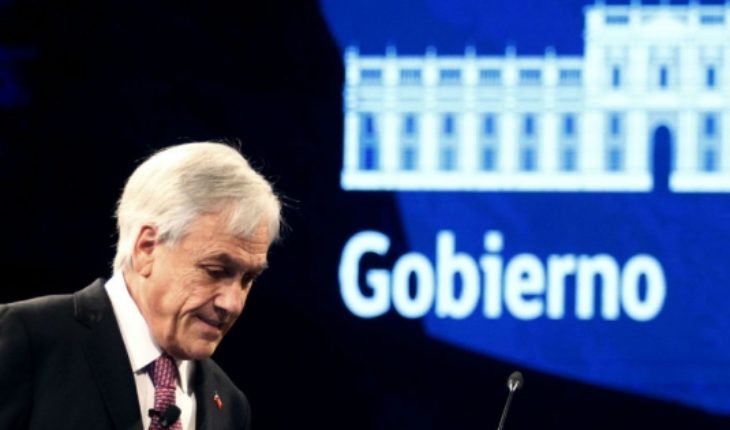Stephen Skowronek, one of the presidency’s leading scholars as an institution, points out that leaders exit Bears do not necessarily do more than other leaders, what they do is control the political sense of their actions and the terms in which their place in history is understood. This creates the possibility of what the author calls “the politics of disjunction,” characterized by government responses to problems failing or falling into irrelevance and government becomes a threat to vitality, if not survival , of the nation. The Macri case is certainly an eloquent example of this situation.
One and a half years into his second term, President Sebastián Piñera faces the worst time since the 2011 student uprising. It is paradoxical that, when it seems to achieve in the Chamber of Deputies to approve tax reintegration, which together with the planned reform is the main task entrusted by its “stakeholders”, it faces with impotence the crisis in the Institute National; the disappearance of its objective of “solving” the problem of La Araucanía (which has gone difrequently to a third or fourth floor); the leadership of MEPs Camila Vallejo, Karol Cariola and Gael Yeomans in the debate on reducing working hours and problems in the FF.AA. where the main constant is the emergence of new irregularities.
He conducts his government in a way that makes him think of an orchestra in which his musicians, instead of playing his instrument with mastery, are engaged in disturbing the auditorium.
Thus appears Minister Cecilia Pérez instrumentalizing politically the difficulties of PS in addressing the problems arising from the impact of the mayor of San Ramón in his decision-making.
Minister Cubillos, also acting as the security officer of educational establishments and promoter of effective initiatives and with a high degree of populism (in which the photo of carabinieri on the roofs of the National Institute represents the most lack of judgment: how many days and weeks will stay on the roofs to avoid a new incursion of the hooded?), instead of seeking to be the leader of a crucial area for Chile’s future, such as education and, as if that were little , at war declared with the teachers.
Likewise, Minister Felipe Larraín called to pray at a time when the economy is disrupting, to name just a few examples. This without remembering the “mother’s exits” of the former ministers of Education, Health and Culture. All this renews the feeling that the last cabinet change was a missed opportunity.
At the same time, the narrative with which the President of the Republic wanted to present the government’s objectives in the face of citizenship is blurred: transformation of the country from the convictions of the right, the impetus of a dynamic economy that expanded the capacity for growth beyond the problems of the global economy “on which the government and the country have little to say” (a speech that the right has always reiterated when criticizing the previous government); a style that seeks to promote policies based on extensive national dialogues and an effective government that stops and defeats organized crime and crime.
The current administration has lost the justification and political sense of its work. First of all, it does not begin to understand the orientation of its management, since the relevant initiatives (whether or not it is consistent with its definitions) are intermingled with other propositions that respond only to the negative results of a government survey or an alleged opportunity to gain popularity.
Also because of the citizen’s perception of a certain permissibility of abuse (the quinteros case is only a sample), the sacrifice of certain objectives, such as the delay in approving the increase in basic pensions by being used as a weapon to achieve approving its pension reform and the lack of capacity to resolve critical issues such as that of the National Institute, making it clear at some point even the possibility of closing that institution as the only solution at its disposal. The lack of consistency between the economic results and the expectations created accentuates the disaffected citizen in front of the President of the Republic.
Also in the eyes of the entrepreneur – with whom he committed the reduction of corporate tax, the reversal of tax reintegration without compensation that made sense of tax reform; the planned reform that would project AFPs into the future without concessions to an alternative system – the Government loses its justification and political meaning. This gives us the perceived problems of government political management which fail to convince the entrepreneur of the sense of dialogue, on reforms, with the opposition, because it lacks a clear proposal for the future.
And finally, with regard to its coalition with which it does not get a common diagnosis (which for extreme neoliberals is a surrender and lack of convictions, for the Government it is only an effort to make necessary reform possible); facing growing differences both in terms of policy content and ways to drive them forward and fails after 18 months to build effective coordination mechanisms, being forced to improvise meetings (as was the visit of the President’s last hour to the interior minister’s meeting with the heads of the coalition parties) to get out of the difficulties. All this means that the main forces on the right quickly begin to look at future presidential options, abandoning the bets they placed for the current Manie.
The lack of resolution of these problems does not augur a happy destination on the right. The differences within them will tend to sharpen as the different proposals that are beginning to be profiled in the sector are realized. Even more so as the presidential struggle and other electoral contests are unleashed. In this sense, the Government cannot guarantee the continuity of its project in a new presidential term. Of course, with the difficulties faced by the opposition (high fragmentation, indefinitely postponed substantive political debates and programmatic proposals that do not end up appreciating the changes that the country is experiencing and that force many rethinks traditional propositions) a weight alternative does not appear on the horizon.
With all this, the future of the country appears under the sign of uncertainty and the real danger of lack of governance. Even more so if the threats of a possible international economic recession end up materializing.
The content poured into this opinion column is the sole responsibility of its author, and does not necessarily reflect the editorial line or position of El Mostrador.





